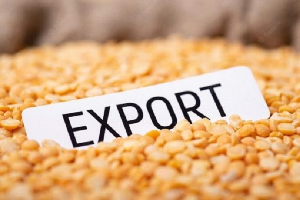Nigeria’s processed food sector is emerging as a bright spot in the nation’s economy, with data revealing increase in export value. The surge is primarily attributed to a strategic shift towards value-added products, particularly within the cocoa industry.
According to the National Bureau of Statistics (NBS), “Prepared foodstuffs; beverages, spirits and vinegar; tobacco” category saw a remarkable rise, jumping from N472.82 billion in the first quarter of last year to N1.43 trillion in the Q1 of this year. This increase elevated its share of total exports from 2.47 to 6.94 per cent, highlighting a growing trend of processing raw commodities before export.
The shift is further supported by data from the Nigerian Export Promotion Council (NEPC), which reported that non-oil exports grew by 19.6 per cent year-on-year to $3.225 billion in the first half of 2025. Cocoa and its derivatives played a dominant role in this growth, accounting for approximately 41 per cent of the total non-oil export value. This indicated that a greater proportion of the crop is being exported as finished products such cocoa butter, liquor, and cake rather than as raw beans.
This pivot towards processing is the result of intensified investment. For instance, Johnvents, a cocoa processor in Ondo, secured a $40.5 million facility to expand its capacity from 12,000 to 30,000 metric tonnes per year. The investment is well-timed, as global cocoa prices have soared due to supply shortages, making value-added processing more profitable. While the export of manufactured goods, including processed foods, is on the rise, Nigeria continues to face a significant trade deficit in the food sector. The country imported N1.67 trillion worth of food and beverages in Q1 2025, a five per cent increase from the previous year. This highlights the dual challenge for policymakers: supporting export-oriented industries while simultaneously addressing domestic supply chain issues, such as high power costs and logistics bottlenecks.
Academic Director for the Agribusiness Management Programme at the Lagos Business School, Dr. Jide Adediji, highlighted significant improvements in the quality of processed food products being exported from Nigeria. According to Adediji, this trend is a result of a growing number of Nigerian businesses focusing on value addition and transforming agricultural raw materials into higher-value products.
Speaking from his expertise in agribusiness and personal experience as a manufacturer, Adediji noted that while there has been an increase in the number of people exporting globally, there is still much work to be done. He pointed to the Agribusiness Management Programme at the Lagos Business School as an initiative designed to equip individuals with the necessary knowledge and skills to succeed in this sector.
The programme, he noted , is critical for showing people how to bring in foreign exchange and contribute to the country’s economic growth. As a practical example of this progress, Adediji shared his own recent success: His Company recently exported its sauces to the United Kingdom, a milestone he sees as indicative of the positive direction the industry is heading. This move, he said, underscored the potential for Nigerian processed foods to meet international standards and compete in global markets.
Looking ahead, industry experts point to several factors sustaining the export momentum. Improved access to foreign exchange, increased compliance with international standards, and ongoing port upgrades are all contributing to the sector’s growth. The Managing Director of Jodriela, Mrs. Yetunde Adegbite, noted challenges facing African small and medium-sized enterprises (MSMEs) in the export market, despite a push for intra-African trade. Speaking on the difficulties of exporting processed food, Adegbite pointed to restrictive policies, high tariffs, and complex regulations imposed by many countries as major impediments. “The major thing that makes it not easy for people to export is the food and the policies, the tariffs, and the restrictions of modern countries,” she said. According to Adegbite, many MSMEs resort to “unofficial exports”—shipping goods valued at less than $500—to avoid the extensive certification processes and bureaucratic red tape. The practice, while common, she noted ,bypasses the official channels needed for sustainable and large-scale growth. She noted that a recent glimmer of hope is the United Kingdom’s decision to remove tariffs and offer duty-free access for over 1,000 food products, a move that could provide a much-needed boost for African exporters.
Director of Training,Institute of Export Operations & Management (IEOM),Dr. Mercy Odibe, agreed that Nigeria is making minimal progress in exporting processed foods, primarily because the bulk of these goods are being sent out through informal channels, making it difficult to track and record their value. “We are aware that people export products through informal means.Exporting these things through informal means, they are not being recorded for Nigeria,” Odibe stated. According to her, the Nigerian Bureau of Statistics tracks the importation of processed foods, revealing a significant and growing trend. “In 2023, Nigeria imported processed foods worth about N365 billion. This figure jumped to N865 billion in 2024 and is projected to reach N941 billion in 2025, a clear indication of a rising reliance on foreign goods. When it comes to exports, however, the official records are nearly blank. The little record that I could find is for a company… a major exporter of cocoa and its derivatives.” The company, which processes cocoa, soybeans, and other commodities, recently received a significant investment from a British international investment firm, which is expected to boost its export capacity. Another notable example is a company that began processing rice in 2023, which is also assumed to be exporting some of its production. Yet, aside from these two isolated cases, there is a severe lack of official data. We don’t really have records, real data, to say this is the quantity of processed foods that have been sent out of Nigeria for this year,” Odibe lamented.
She noted that while the Nigerian Bureau of Statistics tracks processed food imports—revealing a significant and growing trend—the official export records are nearly blank. She called for a national effort to formalise the export process to provide a more accurate picture of Nigeria’s trade balance and celebrate its successes. “It’s better for us to have records; let’s make it formal so that this record should be there and they’ll be recorded for Nigeria, that, ‘yes, this is what we have done, this is what we’ve recorded’,” Odibe concluded.
Business News of Monday, 25 August 2025
Source: www.thenationonlineng.net













